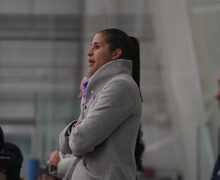Falk College opens nutrition center funded by alumna’s donation
The Falk College officially opened its new, comprehensive nutrition center on Friday, demonstrating another significant step in the college’s transformation.
The Nutrition, Assessment, Consultation and Education (ACE) Center will open further research opportunities for students in the nutrition program, and will also allow the program to remain one jump ahead of accreditation standards, which are revised every five years, said Kay Bruening, the undergraduate program director of the Nutrition Science and Dietetics Program in the David B. Falk College of Sport and Human Dynamics.
The center was funded exclusively through a donation by Rhoda Dearman Morrisroe, a Class of 1969 Syracuse University alumna, according to a Falk College release. It has been a dream 18 years in the making for Bruening and Tanya Horacek, a professor in the department of public health, food studies and nutrition, Bruening said.
“We’re very excited. This will give us more hands-on learning instruction opportunities, but it will also greatly improve our research capacity,” Bruening said.
The two began working with the Falk College development officer about three years ago to raise the money for the project and then received the offer from the donor, Bruening said. Around the same time, the nutrition program received input from students about what they would like to see in the center. This input has been used as a guide to determine what equipment to purchase and put in place, Bruening said.
The ACE Center is comprised of two lecture halls — one of which has a demonstration kitchen, two nutrition counseling rooms, a physical assessment room and a small conference room. The center is located in the Falk Complex in MacNaughton Hall.
The nutrition counseling rooms will enable students in the nutrition dietetics major to be tested on performing nutrition counseling with a standardized patient. Students in a one-credit course called Nutrition Counseling Experience can also have this kind of role-play experience in which they have a client who requires nutrition counseling, such as weight or cholesterol management. The rooms feature equipment such as an electronic stadiometer, which measures height, and an electronic scale.
Equipment in the physical assessment room includes a BOD POD®, an examination table and a full-size adult patient simulator mannequin. The BOD POD® is a “spaceship”-like testing system that assesses the fat and lean on a patient’s body, Bruening said. It can also measure the rate at which the patient is burning calories, she added.
Students will also be able to use equipment such as scales to measure the height and length of multi-ethnic baby dolls and four indirect calorimetry units that measure the amount of calories people are burning. The units will replace the use of mathematical prediction models that predict the same data, but students will be able to measure the difference between the calculated amount of calories and the measured amount of calories, which Bruening said will help promote critical thinking and give students a better awareness of the limitations of prediction techniques.
“The nutrition students will find the Nutrition ACE center intellectually stimulating through the most updated research equipment and learning tools,” Robert Swanda, a senior biology and nutrition science dual major, said in an email. “The Nutrition ACE center will take learning beyond the classroom, and place students into hands-on work that they will experience as a future dietician, health care provider, doctor, or researcher.”
The establishment of the new center accompanied with the consolidation of mostly all the Falk programs into one building seems to be evident of a transformation that Bruening said she sees within the school. The nutrition and food studies programs will move to the Falk Complex once the renovations of the program offices are completed, and the marriage and family therapy program will remain in its facility on Fayette Street, Bruening said.
Having one building for the college is a “major” step in the college’s transformation, said Christina Lipuma, a senior in the Falk College, in an email. Lipuma added that having the Falk Complex “will allow for more collaboration both within and between departments.”
Bruening, who has reviewed accreditation of dietician education programs in 20 states and three foreign countries, said she has never seen a facility better than Falk’s new ACE Center.
“We’ve been dreaming about it for a long time,” she said. “And I hope our students will be as excited about it as the faculty are because the faculty have all these creative ideas of things we can do now with our students. It’s all about the students.”
Published on September 27, 2015 at 8:25 pm
Contact Alexa: atorrens@syr.edu





